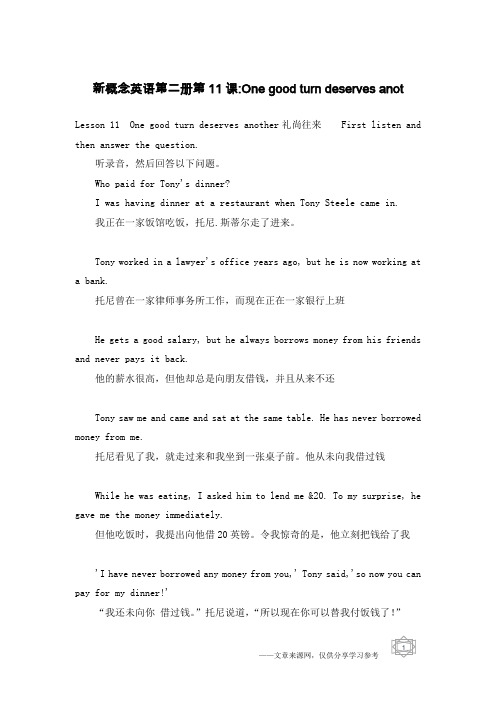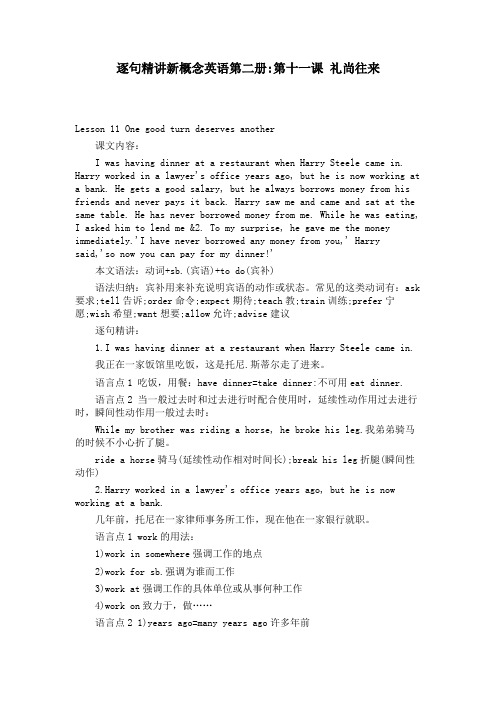新概念英语第二册11课答案
新概念英语第二册课后答案详解

新概念英语第二册课后答案详解Lessons 6新概念英语第二册课后答案详解新概念英语第二册第6课词汇学习Word studyknock(1)vi. 敲门:Someone is knocking at the door.有人在敲门。
I knocked, but no one answered.我敲了敲门,但是没人答应。
(2)vt., vi. 碰撞:You always knock things off the table. 你总是碰掉桌上的东西。
Jim was knocked over by a bus this morning.今天上午吉姆被一辆公共汽车撞倒了。
She has knocked a cup over again.她又碰倒了一个杯子。
(3)vt. 把(某人)打成。
状态:Bob is very strong. He knocked Tom out yesterday.鲍勃很强壮,他昨天把汤姆打昏过去了。
(4)与off连用时有一些特殊的含义。
一般用于口语。
A vt.(价格上)减去,除去,打折扣:They knocked five dollars off the price of the coat. 他们把这件上衣的价格降低了5美元。
B vi. 下班,停止,中断(工作等):When do you usually knock off?你一般什么时候下班?He knocked off for lunch at half past eleven.他11点半休息吃中午饭。
call(1)vt., vi. 叫,喊:I heard someone calling.我听见有人在喊叫。
(2)vt. 呼唤,召唤:Lucy is sick. Please call a doctor.露西病了。
请去叫个医生来。
(3)vi. 访问,拜访;(车、船等)停靠:Amy called(at our house) yesterday.艾米昨天来(我们家)了。
新概念英语第二册课后答案第十一课

Lesson 111. b根据课⽂第6-7⾏I asked him to lend me twenty pounds… he gave me the money immediately, 应该选b. ⽽其他3个选择都不符合课⽂内容。
2. b根据⽂章第⼆阶段8-9⾏“I have never borrowed any money from you,...so now you can pay for my dinner”只有b. the writer hasn't ever lent him any money before 是正确答案。
其他3个选择都与⽂章不符3. ba. was going 时态不对, go into 不表⽰延续时间很长的⼀个动作,不应该是进⾏时;c. has gone 时态不对,表⽰过去发⽣的动作,不应该⽤现在完成时;d. did go 形式不对,只有在疑问句或表⽰强调的句⼦中,才能⽤这种形式;只有b. went最符合该句的时态要求。
4. ab. a year ago(⼀年前),c. since last year(⾃去年以来) 与d. for a year(有⼀年的时间)这三个表⽰时间的短语都不能⽤在现在进⾏时中。
只有a. at the moment 可以同现在进⾏时连⽤,因此选a.5. b这个句⼦是现在完成时,需要⼀个相应的时间短语。
a. last week 不能作现在完成时的的时间状语;c. Since后⾯缺少表⽰时间的名词;d. A week ago 也不能做现在完成时的时间状语;只有b. Up till now(到⽬前为⽌)能同现在完成时连⽤,所以选b.6. c问“多少钱”需要⽤表⽰不可数的疑问词来提问。
a. how many (多少)是对可数的事物或⼈提问的;b. how不能对名词(钱)提问,只能问⽅式或状态d. how few也不能对钱提问,只能修饰可数名词;只有c. how much 是针对不可数的事物提问的,问“多少钱”,只能⽤how much提问,所以选c.7. ca. want to 不合乎题⽬意思;b. want语法不对,也不符合题⽬意思;d. you want to 语序错误;只有c. want you to 最合乎语法和题⽬意思。
新概念英语第二册课后答案(全部)

新概念英语第二册课后答案Lesson11.b选b 最为正确。
因为 a.d. 都与课文内容不符合,也不合乎逻辑; c.的意思是“他们没有注意他”,而作者的意图并不是想让他们注意他,而是想让他们停止谈话。
所以选 b. 最能表达作者当时心里的感受。
2 .c其余 3 个答案都与原句意思不符合。
3 .b因为 a.to 不对,可以是Hewenttothetheatre;c.into 也不对,可以是Hewentintothetheatre;d.on 更不符合语法,表示在某一个地方用介词in 或at,in 表示在大的空间,如国家,城市等,at 则表示在小的地点或空间,如attheoffice,atthetheatre 等, 所以选 b. 是正确的。
4 .db.above( 在⋯⋯上方);c.aheadof( 在⋯⋯的前面,在⋯⋯之前) 不和behind 对应,也不强调位置的前后顺序。
a.before 和d.infrontof 都是和behind 对应的,都有“在⋯⋯前面”的意思。
但infrontof更具体的强调位置,而before 则包含更宽泛的意思,即时间上,空间,次序,登记,重要性方面的“在⋯⋯前面”5 .c因为用 a.Where,b.why,d.when 提问都不符合逻辑,都不是针对状态提问的,只有How提问,才能用Angry 回答。
6 .ab.they 只做主语;c.their 只能做定语; 虽然可以做宾语,但与前一句意思不符合。
7 .da.none 是代词,很少用在名词前面;b.any 只能用在否定句或疑问句中;c.notany 不符合语法,因为前面没有助动词did.8.ba.chair( 椅子) ,c.armchair( 手扶椅)d.class( 班级)这3个选择都和seat 的意思不符合。
Seat 是”座位,座席”的意思。
强调的是可供坐下的地方,不是具体的椅子。
只有 b.place是seat 的同义词。
新概念英语第二册第11课-One good turn deserves anot

新概念英语第二册第11课:One good turn deserves anotLesson 11 One good turn deserves another礼尚往来First listen and then answer the question.听录音,然后回答以下问题。
Who paid for Tony's dinner?I was having dinner at a restaurant when Tony Steele came in.我正在一家饭馆吃饭,托尼.斯蒂尔走了进来。
Tony worked in a lawyer's office years ago, but he is now working at a bank.托尼曾在一家律师事务所工作,而现在正在一家银行上班He gets a good salary, but he always borrows money from his friends and never pays it back.他的薪水很高,但他却总是向朋友借钱,并且从来不还Tony saw me and came and sat at the same table. He has never borrowed money from me.托尼看见了我,就走过来和我坐到一张桌子前。
他从未向我借过钱While he was eating, I asked him to lend me &20. To my surprise, he gave me the money immediately.但他吃饭时,我提出向他借20英镑。
令我惊奇的是,他立刻把钱给了我'I have never borrowed any money from you,' Tony said,'so now you can pay for my dinner!'“我还未向你借过钱。
新概念英语第二册第11课

Tell the story 复述故事
1 dinner - restaurant - Tony Steele 2 worked - lawyer's office- now - bank 3 good salary - always borrows - his friends - never - back 4 saw me - came - sat - table 5 never borrowed - me 6 While - eating - asked - lend me twenty pounds 7 surprise - gave me - immediately 8‘I - never - money - you,’Tony -,‘so now - pay - dinner’
Let’s have a break.
Exercise 练习
A Which verbs in the passage tell us a what is happening now; b what always happens;c what happened;d what has happened;e what was happening when/while…? 在课文中选出表达以下意思的动词:a现在正在进行的动作;b通常发生 的事情;c过去发生的事情;d已经发生的事情;e过去某一特定时刻正在 进行的动作。 B Give the correct form of the verbs in parentheses. Do not refer to the passage until you finish the exercise. 用正确的时态填空,完成练习后再对照课文核对你的答案。 I ______ (have) dinner at a restaurant when Tony Steele ______ (come) in. Tony ______ (work) in a lawyer's office years ago, but hen now ______ (work) at a bank. He ______ (get) a good salary, but he always (borrow) money from his friends and never ______ (pay) it back. Tony ______ (see) me and ______ (come) and ______ (sit) at the same table. He never ______ (borrow) money from me. While he ______ (eat), I ______ (ask) him to lend me twenty pounds. To my surprise, he ______ (give) me the money immediately. ‘I never ______ (borrow) any money from you, * Tony ______ (say), ‘so now you can pay for my dinner!*
裕兴新概念英语第二册笔记 第11课

Lesson 11 0ne good turn deserves another 礼尚往来Who paid for Tony's dinner?I was having dinner at a restaurant when Tony Steele came in. Tony worked in a lawyer's office years ago, but he is now working at a bank. He gets a good salary, but he always borrows money from his friends and never pays it back. Tony saw me and came and sat at the same table. He has never borrowed money from me. While he was eating, I asked him to lend me twenty pounds. To my surprise, he gave me the money immediately. 'I have never borrowed any money from you,' Tony said, 'so now you can pay for my dinner!'参考译文我正在一家饭馆吃饭,托尼.斯蒂尔走了进来。
托尼曾在一家律师事务所工作,而现在正在一家银行上班。
他的薪水很高,但他却总是向朋友借钱,并且从来不还。
托尼看见了我,就走过来和我坐到一张桌子前。
他从未向我借过钱。
当他吃饭时,我提出向他借20英镑。
令我惊奇的是,他立刻把钱给了我。
“我还从未向你借过钱,”托尼说道,“所以现在你可以替我付饭钱了!”【New words and expressions】(6)turn v.turn on; turn off (装有阀门、有开关的东西)turn on the light 打开灯turn off the light 关掉灯turn on the TV 打开电视turn off the TV 关掉电视turn on the tap 打开水龙头turn off the tap 关掉水龙头turn down 调小一些turn up 调大一些turn over 翻身turn round 转过身来turn around 转过身来take sb down/let sb down 让…..失望eg. Don't turn your mother country down. 不要让祖国失望。
逐句精讲新概念英语第二册第十一课 礼尚往来

逐句精讲新概念英语第二册:第十一课礼尚往来Lesson 11 One good turn deserves another课文内容:I was having dinner at a restaurant when Harry Steele came in. Harry worked in a lawyer's office years ago, but he is now working at a bank. He gets a good salary, but he always borrows money from his friends and never pays it back. Harry saw me and came and sat at the same table. He has never borrowed money from me. While he was eating, I asked him to lend me &2. To my surprise, he gave me the money immediately.'I have never borrowed any money from you,' Harrysaid,'so now you can pay for my dinner!'本文语法:动词+sb.(宾语)+to do(宾补)语法归纳:宾补用来补充说明宾语的动作或状态。
常见的这类动词有:ask 要求;tell告诉;order命令;expect期待;teach教;train训练;prefer宁愿;wish希望;want想要;allow允许;advise建议逐句精讲:1.I was having dinner at a restaurant when Harry Steele came in.我正在一家饭馆里吃饭,这是托尼.斯蒂尔走了进来。
新概念英语第二册第11课

Eg. He gets a good salary, but he always borrow money from his friends and never pays it back.
salary 指公职人员、职员等拿按年、按月 计算的“年薪”或“月薪”
• Who paid for Tony’s dinner? Probably the writer.
Read the passage again and answer the following questions: At a restaurant
• 1. Where were you having dinner? • 2. Did you see Tony SteeIlesaefetehrima wahftileeroar wnohti?le.
a salary man领薪族(=a salaried man) wages:工人等拿的“工资”, 一般按日、
按时或按件计算
• 6. immediately adv.马上,立即 • 〔英国〕一…(就…) (= as soon as) • I told him immediately he came. 他一来
Let’s go dutch. AA制 This time is your treat. next time is my turn. 这次你请客,下次轮到我。
Go Dutch 的来历
英国人喜欢打仗、而且不管交战的对手 是谁?不管这场战役到底结果是英军大胜、 还是英军惨败,只要战争结束之后赶快帮 敌人取一个浑号、来嘲笑一番。
EG: We worked away for months in all weathers, and the hard work at last pay off very much.我们不论天气好坏, 连续干了三个月,艰苦的劳动终于有了很好的结果。
- 1、下载文档前请自行甄别文档内容的完整性,平台不提供额外的编辑、内容补充、找答案等附加服务。
- 2、"仅部分预览"的文档,不可在线预览部分如存在完整性等问题,可反馈申请退款(可完整预览的文档不适用该条件!)。
- 3、如文档侵犯您的权益,请联系客服反馈,我们会尽快为您处理(人工客服工作时间:9:00-18:30)。
新概念英语第二册11课答案【篇一:新概念英语第二册第11课】ves another 礼尚往来i was having dinner at a restaurant when tony steele came in. tony worked in a lawyers office years ago, but he is now working at a bank. he gets a good salary, but he alwaysborrows money from his friends and never pays it back. tony saw me and came and sat at the same table. he has never borrowed money from me. while he was eating, i asked him to lend me twenty pounds. to my surprise, he gave me the money immediately. i have never borrowed any money from you, tony said, so now you can pay for my dinner!new words and expressions 生词和短语turn n. 行为,举止 deserve v. 应得到,值得 lawyer n. 律师bankn. 银行 salary n. 工资 immediately adv. 立刻 tony [?t?uni]参考译文我正在一家饭馆吃饭,托尼.斯蒂尔走了进来。
托尼曾在一家律师事务所工作,而现在正在一家银行上班。
他的薪水很高,但他却总是向朋友借钱,并且从来不还。
托尼看见了我,就走过来和我坐到一张桌子前。
他从未向我借过钱。
当他吃饭时,我提出向他借20英镑。
令我惊奇的是,他立刻把钱给了我。
“我还从未向你借过钱,”托尼说道,“所以现在你可以替我付饭钱了!”1.one good turn deserves another 礼尚往来这是句谚语,意思是对于别人的善意或帮助应作出相应的回报。
1) 名词turn的含义之一是“(帮助或损害他人的)举动”、“行为”:e.g. 乔治昨天做了一件对我有利/不利的事。
yesterday george did me a good/an ill turn. 他总是乐于为他人做好事。
he is always ready to do a turn for others.turn n. / v.n. [c]1. an act of turning sb./sth. around 转动;旋动e.g. 转动几下把手。
give the handle a few turns.2. a change in direction in a vehicle(车辆的)转弯;转向e.g. 向左/右拐入西大街。
make a left/right turn into west street.3. a bend or corner in a road (道路的)弯道;拐弯处e.g. 弯弯曲曲的小巷 a lane full of twists and turns(lane [lein] n. 1. (乡间)小路2. (尤用于地名)小巷;胡同;里弄(long)3.车道 4.(比赛的)跑道;泳道 5.航道;航线twist [twist] n. 1.[c] 急转弯处;曲折处2. [c]转动;旋转;搓;捻;拧;扭动 3. [c] (故事或情况的)转折,转变,突然变化 v. 1. vt. 使弯曲,使扭曲(成一定形状)2. (使)弯曲变形,扭曲变形 3. 扭转;转动(身体部位))4.[c] the time when sb. in a group of people should or is allowed to do sth. (依次轮到的)机会, 顺次e.g. 轮到你时,再抓一张牌。
when it’s your turn, take another card.下次该轮到我开车了。
it’s my turn to drive next.idm:1) in turn(1) one after the other in a particular order依次;轮流;逐个e.g. 孩子们逐一自报姓名。
the children called out their names in turn.(2) as a result of sth in a series of events相应地;转而e.g. 增加生产会继而增加利润。
increased production will, in turn, lead to increased profits.(lead to sth 导致;造成后果)2) take turns(in sth./to do sth)(bre also take it in turns) 依次;轮流e.g. 雄鸟和雌鸟轮流伏窝。
the male and female birds take turnsin sitting on the eggs. 我们轮流做家务。
we take it in turns todo the housework.5. an unusual or unexpected change in what is happening (异乎寻常或意外的)变化,转变e.g. 在以后的几周里,事态急转直下。
events took a dramaticturn in the weeks that followed.6.[c] 行为;举止做有利于/有损于某人的事 do sb. a good/badturne.g. 昨天乔治做了一件对我有利的事。
yesterday george did mea good turn.idm:1) (do sb.) a good turn (to do) sth. that helps sb. (为某人做)好事,善事;(做)有助于某人的事e.g. 好啦,这就是我今天做的好事。
well, that’s my good turn for the day.2) one good turn deserves another(saying)you should help sb. who has helped you 善须善报;要以德报德;好人应得好报7. [the+s (of)]时间上的转折点;交替时期idm. the turn of the century/year the time when a new century/year starts 世纪之交;新年伊始;辞旧迎新之际 e.g. 这是在世纪之交修建的。
it was built at the turn of the century.idm: at every turn everywhere or every time you try and do sth处处;事事;每次e.g. 我事事都不顺心。
at every turn i met with disappointment.v.1. to move or make sth. move around a central point (使)转动;旋转e.g. vi. 汽车的轮子开始转动起来。
the wheels of the car began to turn.vt. 他转动钥匙开锁。
he turned the key in the lock.2. [usually+adv./prep.] to move your body or part of your body so as to face or start moving in a different direction 转身;扭转(身体部位)e.g. vi. 我们转身朝家走去。
we turned and headed for home.vt. 他转身背对着墙。
he turned his back to the wall.3. [vn.+adv./prep.] to move sth. so that it is in a different position or facing a different direction.翻转;翻动;把?翻过来e.g. vt. 她把椅子翻转过来修理。
she turned the chair on its sideto repair it.4. (使)改变方向;转弯e.g. vi. 他拐进了一条狭窄的街道。
he turned into a narrow street. vt. 那男人转过街角就没影了。
the man turned the corner and disappeared.5. vi. (潮汐)to start to come in or go out开始涨(或落)e.g. 涨潮了,我们最好回去吧。
the tide is turning-we’d betterget back.(tide [taid] n. 1.[c, u] 潮,潮汐2.[c] 潮流;趋势;动向)6. 翻,翻动(书页)e.g. vt. 他坐在那里无所事事地翻着书。
he sat turning the pages idly.(idly [?a?dl?] adv. 懒惰地;无所事事地,闲着 adj. idle [aidl] adj. 空闲的, 闲着的;懒散的, 无所事事的)vi. 反到第23页。
turn to page 23.7. to change into a particular state or condition; to make sth do this (使)变成;成为e.g. 天气变得寒冷多风。
the weather has turned cold and windy.秋天树叶变黄。
in autumn the leaves turn brown.8. (vi. + adv./prep.; vt.+ object+adv./prep.)(使)转变(形态、性质等)(尤与from; into连用) e.g. 经过50年,这个地方从一个小村庄变成了大城镇。
in fifty years, this place has turned from a little village into a large town.女巫把王子变成了青蛙。
the witch turned the prince into a frog. (wizard [?wiz?d] n. 男巫;术士;神汉)9.[v-n] (not used in the progressive tenses 不用于进行时) to reach or pass a particular age or time 到达,超过(某一年龄或时间)e.g. 他到六月份就满21岁了。
